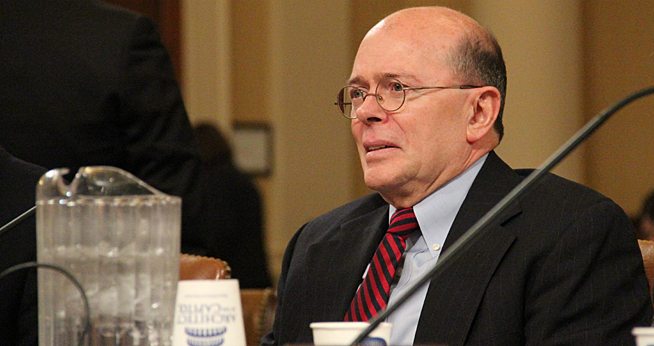Treasury Nominee Commits to Address “Barriers to U.S.-Armenia Economic Relations”; State Department Official Testifies that Tax Treaty is “Under Active Consideration”
WASHINGTON—David Kautter, the incoming Assistant Secretary of the Treasury for Tax Policy, expressed willingness, during his Senate confirmation process, to engage with Congressional stakeholders and professional Treasury Department staff regarding a U.S.-Armenia Double Tax Treaty, an economic accord, backed by the Armenian National Committee of America (ANCA), aimed at removing barriers to the growth of bilateral trade and investment.

David Kautter, the incoming Assistant Secretary of the Treasury for Tax Policy (Photo: american.edu)
Kautter’s comments were reinforced earlier today by Acting Assistant Secretary of State John Heffern, who, in response to questions posed by Rep. Brad Sherman (D-Calif.) during a Congressional hearing, testified that a U.S.-Armenia Double Tax Treaty is “under active consideration” by the Department of State.
Video from the hearing is available below:
[youtube https://www.youtube.com/watch?v=MxQml11aPJ4?feature=oembed&w=620&h=349]
Kautter’s nomination, which was unanimously approved by the Senate Finance Committee on July 18th, has been sent to the full Senate. During his confirmation timeframe, he was asked about a U.S.-Armenia Tax Treaty by Senator Bob Menendez (D-N.J.), who sits on the Finance Committee, and Representative Brad Sherman, a member of the House Foreign Affairs Committee, who is widely recognized as a top Capitol Hill expert on international tax policy. Responding to Congressional inquiries, Kautter committed, if confirmed, to study how to “adequately address any impediments to U.S.-Armenia economic relations.” In response to separate questions, he specifically expressed his willingness to examine the “pros and cons of a Tax Treaty with Armenia,” and, more broadly, to “learn more about the barriers to U.S.-Armenia economic relations.”
Heffern, who served as Ambassador to Armenia from 2011 to 2014, is widely credited for the pivotal role he played in supporting Armenia’s aid to trade transition, including through a variety of bilateral initiatives, including the U.S.-Armenia Trade and Investment Framework Agreement finalized in May 2015.
“We are gratified to see that both our Treasury and State departments are increasingly open to negotiating a U.S.-Armenia Double Tax Treaty, a long overdue bilateral accord that will, once ratified, remove a major barrier to the further growth of the U.S.-Armenia economic relationship,” said ANCA Executive Director Aram Hamparian. “We look forward to continuing our work with stakeholders in Washington and Yerevan to pursue mutually-beneficial, job-creating initiatives across IT, healthcare, tourism, finance, education, and other sector-specific drivers of economic growth.”
The current treaty governing double taxation issues between the United States and Armenia is the 1973 U.S.-U.S.S.R. Tax Treaty, an outdated forty year-old accord. The lack of a double tax treaty between the two countries creates legal uncertainty that deters potential U.S. investors, diverts investment flows and disadvantages American businesses seeking to invest in the Republic of Armenia.
Source: Armenian Weekly
Link: U.S. Administration Officials Open to Talks on U.S.-Armenia Double Tax Treaty
